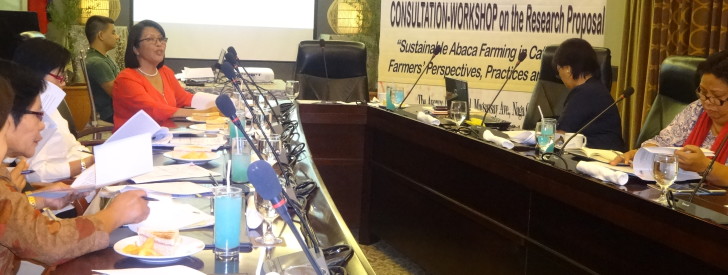 Catanduanes State University President Dr. Minerva I. Morales presents the proposal entitled “Sustainable Abaca Farming in Catanduanes: Farmers’ Perspectives, Practices and Prospects” to PRDP-Bicol and PhilFIDA representatives during a consultation-workshop held on April 26, 2016 at Avenue Plaza Hotel.
Catanduanes State University President Dr. Minerva I. Morales presents the proposal entitled “Sustainable Abaca Farming in Catanduanes: Farmers’ Perspectives, Practices and Prospects” to PRDP-Bicol and PhilFIDA representatives during a consultation-workshop held on April 26, 2016 at Avenue Plaza Hotel. PRDP-Bicol, PhilFIDA, CSU firm up R&D proposal for sustainable abaca farming in PH’s “Abaca County”
April 26, 2016
The Department of Agriculture’s Philippine Rural Development Project (DA PRDP) in Bicol, in collaboration with the Philippine Fiber Industry Development Authority (PhilFIDA) and Catanduanes State University (CSU) firmed up the research proposal to study abaca farming in Catanduanes during a consultation workshop held on April 26 in Avenue Plaza Hotel.
Dr. Minerva I. Morales, President of CSU, presented the proposal entitled “Sustainable Abaca Farming in Catanduanes: Farmers’ Perspectives, Practices and Prospects” to a panel led by PRDP Deputy Project Director Dr. Elena B. De los Santos and PhilFIDA representatives headed by OIC Regional Director Mary Anne R. Molina. The proposal was formulated to address the limited abaca product research and development which was identified in the Provincial Commodity Investment Plan (PCIP) as one of the key gaps or constraints to the growth of the abaca industry in the island province.
Catanduanes is the country’s top producer of abaca contributing 34.9 percent to the country’s total production. Eleven out of 12 municipalities in the province have abaca farms equivalent to 31,051.25 hectares production area. It also has an average production of 600 kilograms per hectare, the highest compared to the regional yield of 430 kilograms per hectare and national yield of 340 kilograms per hectare. About 12,789 of the province’s population are engaged in abaca farming.
To develop a model of a sustainable abaca farm, a team of faculty researchers from CSU and technical staff from PhilFIDA will evaluate sustainable farming system in the context of abaca farmers’ knowledge, perspectives, and farming practices. The research was proposed for funding under the I-PLAN component of PRDP which hopes to provide support worth 2.68 million US dollars to coordinated technical support services for the value chains and priority sub-projects cited in the PCIP.
The study will focus on the evaluation of abaca farms in seven municipalities in the province based on the Sustainable Agriculture Initiative (SAI) Platform Principles or indicators of sustainability including site selection and management, planting material, crop management, sustainability management system, improvement mechanisms and access to information and support services.
Phase 1 of the research proposal will be on benchmarking and establishment of indicators of the sustainability of abaca farming in Catanduanes while phase 2 will focus on product development and capability enhancement based on the findings in phase 1.
According to Morales, the project is an opportunity for the university to improve its research function as one the university’s priority mandates.
Meanwhile, De los Santos, who concurrently serves as OIC-Regional Executive Director of Department of Agriculture V considers the undertaking as another opportunity for the industry stakeholders to work together for the common benefit of abaca farmers.
PRDP-Bicol I-PLAN Component Head Aloha Gigi I. Bañaria and I-PLAN Planning Specialist Mary Ann R. Cuya facilitated the consultation-workshop which laid out the roles and functions of PRDP-Bicol, PhilFIDA, CSU, and the local government unit of Catanduanes in the research process.
The final copy of the research proposal will be submitted to PRDP-Bicol for review and endorsement to PRDP South Luzon. A Memorandum of Agreement to seal this collaborative research and development undertaking is tentatively set for signing on May 23, 2016 to coincide with the province’s 1st Abaca Festival.
In February 2016, PRDP-Bicol also endorsed for approval the Province of Catanduanes’ proposed business plan for the Abaca Fiber Processing and Trading Enterprise under its enterprise development (I-REAP) component.
PRDP is a six-year development project being implemented by the DA that aims to raise farmers’ income and establish an inclusive, market-oriented, and climate-resilient agriculture and fisheries sector. (Annielyn L. Baleza, I-SUPPORT InfoACE Unit, DA-RAFIS 5)
